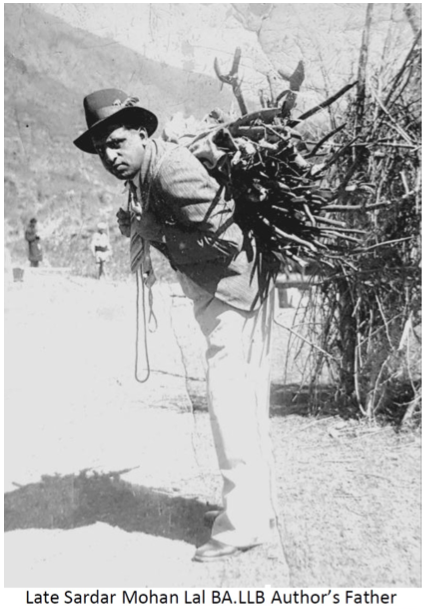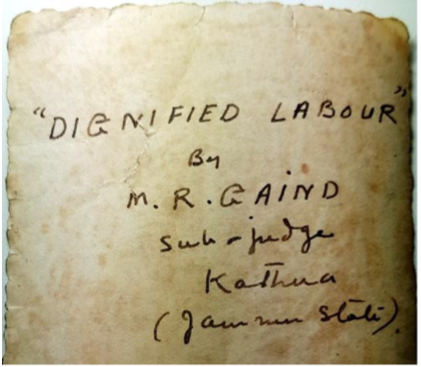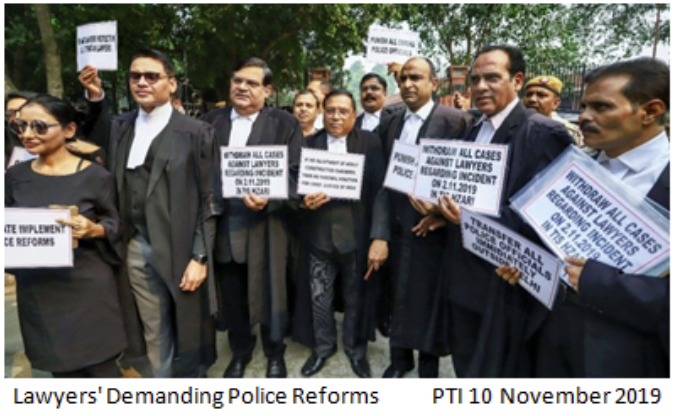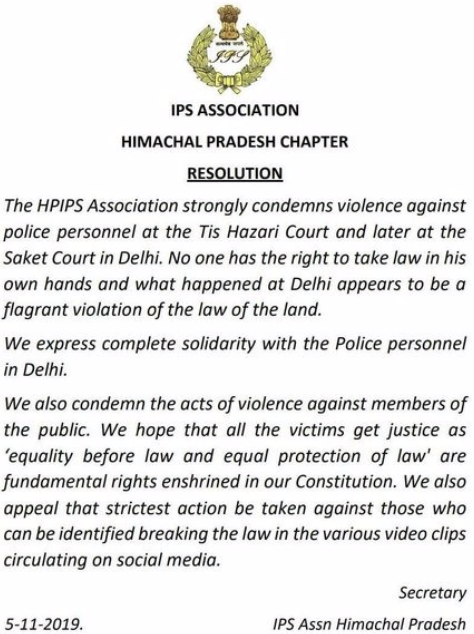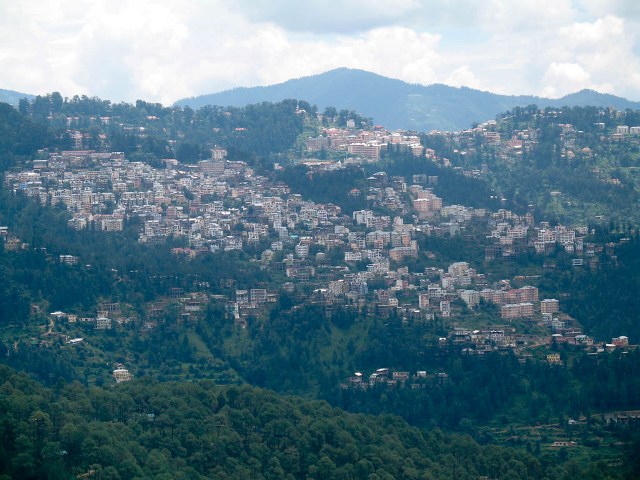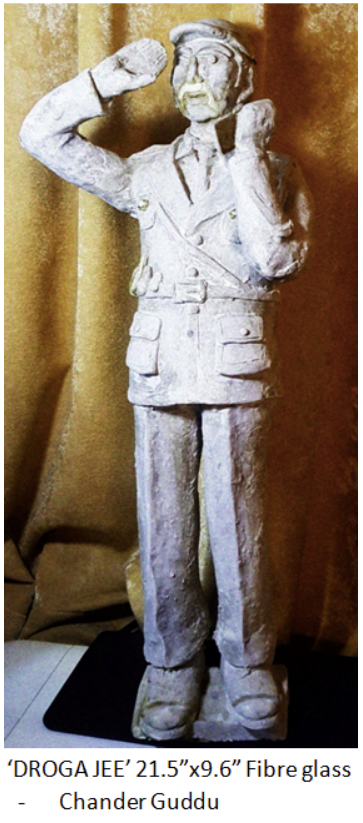
The history of the Indian Police under British rule is marked by a series of attempts to introduce more advanced standards of conduct and integrity, and to raise the tone of the force by improving the pay and prospects of its members. For the sake of reforms, among the conclusions and recommendations of Lord Lansdowne’s Government* in 1890 were:
(1) That the net pay of constables should be fixed at not less than Rs. 7 a month;
(2) That the pay and position of investigating and inspecting officers should be greatly improved, and that deserving inspectors of Police should be considered eligible for appointment to the Provincial Service.
My father, a law graduate from Lahore, was appointed ‘Court Inspector’; a prosecutor in uniform. Being an eminent professional; in recognition of his able services and model conduct the title of ‘Sardar’ was conferred up on him by the Government. Mr. M R Gaind the then ‘sub Judge’, Kathua, wrote the caption “Dignified Labour” for the photograph showing him carrying the weight of the clustered ‘twigs of firewood ’- as a gesture . Unfortunately, he died young in my early childhood. My mother often told me the tales of ‘the fear of khaki’ in those days. Mr. Ramesh Shah of Ghandhinagar, shares vivid memories, of his boyhood; “…Well turned out, how smart your father looked in his ceremonial uniform of high boots..”.
Today, while I watch my son, a decorated soldier, doing well in Indian Police Service, I feel as if my father is blessing his third generation from his Heavenly abode.
- The role of the prosecutor, as I came to understand, had three main tasks: to investigate crimes, to decide whether or not to instigate legal proceedings and to appear in court. … He shall have contact with the person suspected of the crime, the victim and witnesses, and have close contact with the police; and perform legal research to plan the prosecution of each case.
- Now, in the new Union Territory (UT) of Jammu and Kashmir, the police have been stripped of the “prosecution” wing. The order has caused consternation among police officers.
Indian Police have completed over 70 years as a Police of democratic, secular and pluralistic society.
Induction of women in policing after independence has been a noticeable welcome trend.
The ongoing clash amongst the galaxy of lawyers and the dignified police force has bared the shreds of the delicate fabric of the stylish Democratic Governance; showing a “new low” in the country’s history..”
- Smoke and roaring fires. An advancing tide of black coats; and a retreating police team, a barrier of hands raised to no avail. According to eyewitnesses, when the lawyers attacked the policemen, those in khaki ran to the lock-up in the court premises to save themselves. The crowd of lawyers outside tried to break the lock of the cell, failing which they set fire to the front portion.
- That our police force has ample ‘wit and wisdom’, makes every Indian proud. The violent clashes could have had a very dark outcome; over 150 hardened criminals could have been out on the streets. Despite being outnumbered and cornered, the policemen used their presence of mind and fastened the gates of the lock-up at the court with handcuffs and stationed a table there so that the lawyers couldn’t force their way inside.
- Sharing a video of the Tis Hazari incident where a policeman is seen being dragged and beaten by over 50 lawyers in the court premises, senior IPS officer Aslam Khan posted on Twitter “.. For how long police will be at receiving end just because they have no support and leadership.” Another Video footage emerged showing a fully-robed lawyer punching and slapping a policeman on a motorbike, prompting protest.
- Bengaluru police commissioner Bhaskar Rao says “…that the police force is a responsible force. Any action or inaction has severe consequences.. We should be able to take as much hurt as possible, we have to take injury, hurt. Somebody should be on the side of the state,”
- A woman police officer — DCP North Monika Bhardwaj — appeals for calm before being mobbed by lawyers.
- Delhi Police’s protesting personnel demanded “We also want a police association,…” Various state chapters of IPS Association’ as also the IAS Association’ are crying hoarse, condemning the physical attack and abuse of uniformed police officers of Delhi police. Now that the government has refused to recognize the legality of the IPS Association; ‘that the police force does not have the right to form any association without the permission of the central government’; there is turmoil in IPS ranks.
- “Our fight for Advocates Protection Act will continue…” The lawyers’ association have demanded that an FIR should be registered against the police officers for their “criminal acts”. They are raising placards demanding Police Reforms.
- On the other hand there is no mechanism for registering a complaint against erring police officials. The Second Administrative Reform Commission has accepted the need for having an independent complaint authority to inquire into the cases of police misconduct.
- Thousands of police personnel protested outside the Police Headquarters.
- “Won’t allow Cops to descend into Mob Mentality”: says a Government spokesman.
“Indian Police” is an umbrella term, which denotes not only state police forces of India but also various Central Police Organisations . The Indian Police Service is not a force itself but a service providing leaders and commanders to staff the state police and all-India Central Armed Police Forces. It is high time to take a reappraisal of their achievements, failures, problems and over all image.
Existing police system suffers from myriad deficiencies:
- The creation of newer forms of crime vis- a- vis cyber (computer) has caught Indian Police unprepared for the task.
- The police-population ratio, currently 192 policemen per lakh population, is less than what is recommended by UN i.e. 222 policemen per lakh population.
- Overburdening of work not only reduces the effectiveness and efficiency of the police personnel but also leads to psychological distress which contributes to various crimes committed by the policemen.
- The force continues to depend on outdated and unserviceable weapons.
- Police mobility is another issue, this compromises the swiftness of action and increases the response time of the police force.
Another problematic area relates to the communication networks.
- In an era of ICT (Information and Communication Technologies), the police system is still struggling to get the Police Telecommunication Network (POLNET).
- The Crime and Criminal Tracking Network and System (CCTNS) was envisaged to link every single police station in the country. Some states are still lagging in project implementation.
- The Indian policing system also suffers from its century-old recruitment process. The recruitment process of police personnel, especially from lowest constabulary level to Sub-Inspector level, is medieval.
Over the years:
- Post of Director General, Additional Director General, Inspector General of Police and so on, much more in proportion to the real needs, is creating role-conflict and lack of job satisfaction among senior police officers.
- Growth of Central Police Organisations has resulted in over shadowing the State civil police.
- Though educational; and academic qualifications of police personnel have gone up but it has also resulted in police unionism, low morale, growing indiscipline and lack of commitment to the work.
- With the increase in armed police forces over the years, militarization of police has upset the balance between civil police and armed police. Indian Police over the years is accused of being trigger happy.
- Whereas, law enforcement agencies across the globe are focusing on Community Policing strategies that help prevent crime, reduce fear of crime and ensure safety and security of the community (Anglo-Saxon times ) in India, today, role of community policing is at the lowest ebb.
- In blatant defiance, a heinous and barbaric incident in which an 80-year-old lady was declared a sorceress and made to wear a shoe-garland and paraded across the village with her face-blackened, has jolted the entire Himachal Pradesh as also the whole civilization over the Globe. “the police received a complaint but the complainant did not want action against the accused”
- The panacea to these problems is the police reform process that has been debated for decades with no results. Till now, six committees, including the National Police Commission, have been set up by the government. These committees made recommendations in favour of major police reforms. However, till date, these have not seen the light of the day.
- In a major boost to police reforms , the government of India has already approved a Rs. 25000-crore outlay for upgrading the internal security apparatus in states; an umbrella scheme on ” Modernization of Police Forces ” with money to be spent in three years from 2017-18.
- Bureau of Police Research and Development & CAG have, however, brought forth the under utilization of funds.
All these challenges require immediate attention of the governments — both at the Centre and the States. People need to understand that the dilapidated condition of the police system will negatively impact upon the security and integrity of the nation. It is time that we transform it from ‘Ruler’s Police’ to ‘People’s Police.’
…………………………………………………………………………………………………………………………………………………………………………………………..
‘DAROGA JEE’ by Chander Guddu is a satire on the overburdened ‘Police Force’.
* Indian Police Commission, for 1902-03
Prof. (Er.) Chander P Mahajan is an art critic & a free lance journalist. The Environmentalist stays in Shimla and Dalhousie, Himachal Pradesh, India.


